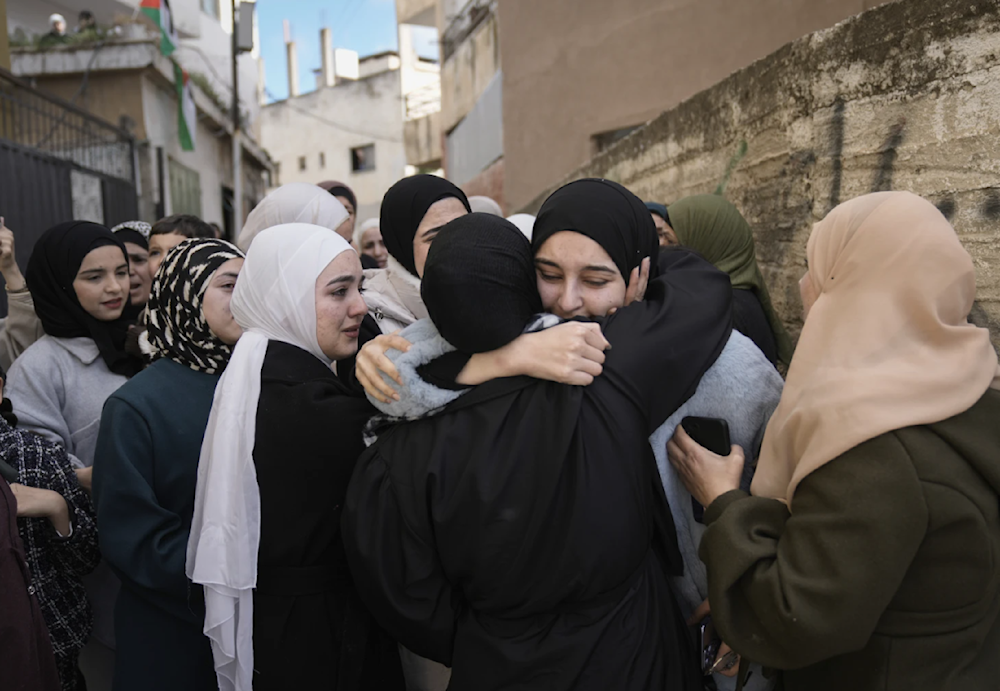On Int'l Women's Day, Palestinian women languish in Israeli prisons
Since October 2023, prisoner advocacy organizations have reported 490 incidents involving female incarceration, including minors.
-

Dunya Shtayyeh was released from an Israeli prison as part of a ceasefire deal between "Israel" and Hamas in the West Bank in the village of Salem on January 20, 2025. (AP)
The Israeli occupation is keeping 21 Palestinian female prisoners who are being subjected to systematic and coordinated atrocities incarcerated, two Palestinian prisoners' rights organizations revealed.
In a joint report on International Women's Day, the Commission of Detainees' and Ex-Detainees' Affairs and the Palestinian Prisoners Society (PPS) stated that the abuses have escalated since the start of the Israeli war on Gaza.
The report detailed the various abuses the prisoners faced, including malnutrition, systemic medical negligence, sexual assault, continuous raids on their cells, theft, deprivation, and psychological torment.
According to the rights groups, targeting women is a common practice rather than an isolated incident. The most significant change lies in the level of crimes committed against them.
The prisoners include two young girls, one of whom is just 12 years old, 12 moms, one of whom is pregnant in her third month, two administrative detainees, six teachers, a journalist who is a media student, and numerous ill prisoners, including one suffering from cancer.
Furthermore, two women have been detained since before Operation Al-Aqsa Flood on October 7, 2023, and Israeli authorities refuse to include them in the prisoner-captive exchange process.
Since October 2023, prisoner advocacy organizations have reported 490 incidents involving female incarceration, including minors. This covers women arrested in the West Bank, al-Quds, and the 1948-occupied territories. The precise number of women jailed in Gaza remains unknown.
Last Monday, the Palestinian Ministry of Foreign Affairs and Expatriates requested an international probe into Israeli abuses against Palestinian prisoners following the death of a Palestinian detainee in the Israeli Megiddo prison, Khaled Mahmoud Qassem al-Abdallah.
Israeli prison treatment kills Palestinians
The Commission of Palestinian Detainees and Ex-Detainees Affairs shed light in November 2024 on the alarming conditions detainees face in Israeli prisons, noting that most detainees are brought to visits in handcuffs.
The commission revealed in a statement that two Palestinians were killed in Israeli prisons as a result of systematic crimes committed by the Israeli occupation through slow death and deliberate medical neglect, worsened by abuse and maltreatment.
The statement highlighted that these crimes form part of a long-standing policy of the occupation targeting Palestinian detainees, encompassing acts of torture, deliberate medical neglect, and the systematic abandonment of prisoners to endure suffering and succumb to illness, emphasizing the growing number of violations committed against detainees, particularly in the context of the ongoing genocidal war on Gaza.
Many sick prisoners face deteriorating health conditions while the occupation continues to deny them necessary medical treatment, further contributing to the rising death toll within the prisons.
Moreover, the commission revealed in September 2024 that 1,200 Palestinians were facing systematic abuse, torture, abuse, and assault in Israeli prisons, with testimonies from Palestinian detainees exposing severe violence, rape, electrocution, extreme hunger, humiliation and other forms of maltreatment.
Megiddo Prison holds a notorious reputation of severe torture and abuse, described by the Palestinian Prisoners Club as one of the central prisons where the Israeli occupation detains Palestinians.
Dozens of testimonies emerged from detainees describing the brutal acts carried out by the Israeli suppression units, involving torture and severe abuse, with systematic mistreatment mentioned in their accounts, including violent raid operations and extremely harsh detention conditions.

 3 Min Read
3 Min Read








